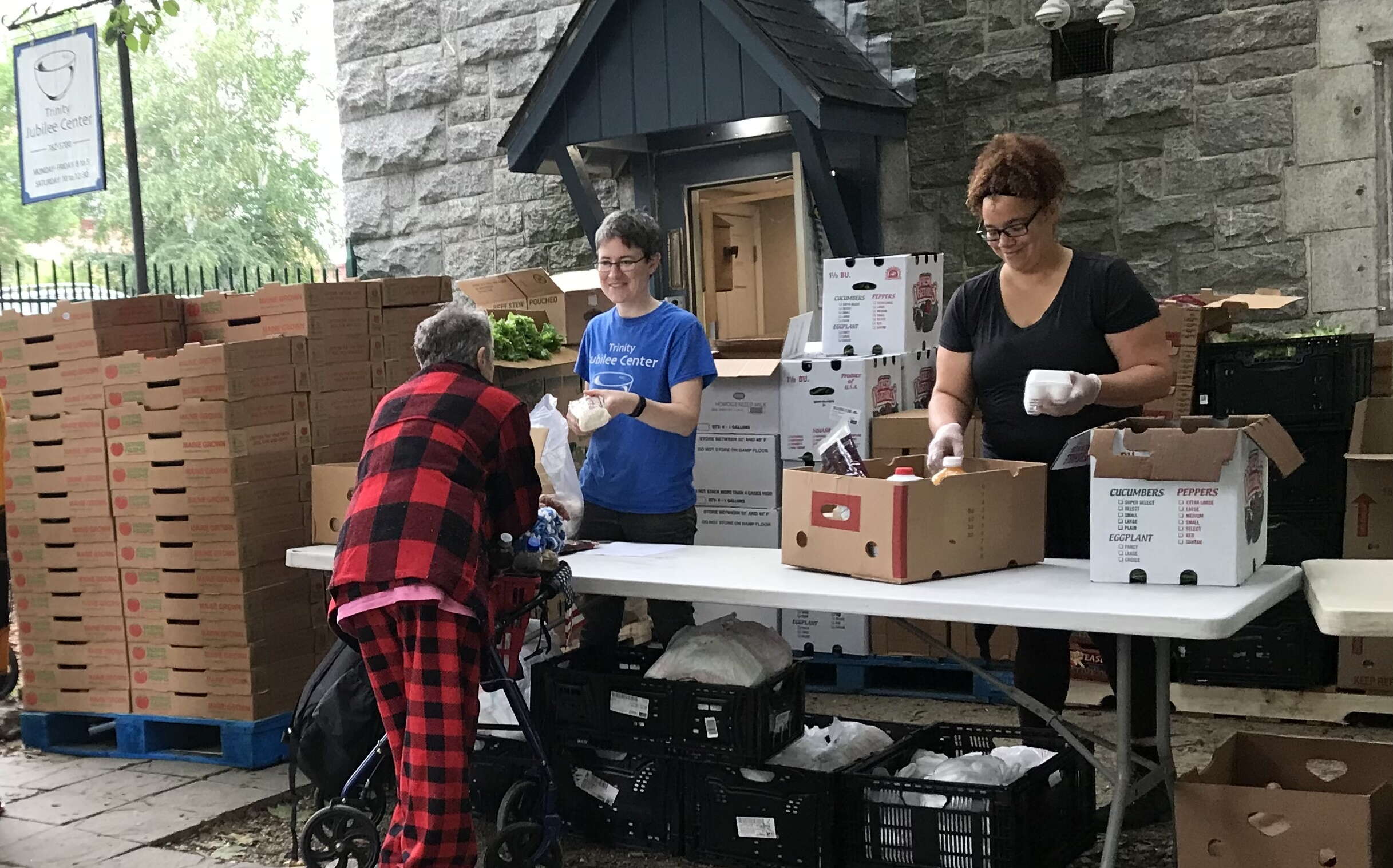
Processing Your Payment
Please do not leave this page until complete. This can take a few moments.
As demand increases, Lewiston social services provider plans larger facility
 Rendering / Courtesy, Trinity Jubilee Center
The purpose-built center will double day shelter capacity and offer a fully equipped doctor’s office, health access center, client services office, larger kitchen and indoor food distribution area.
Rendering / Courtesy, Trinity Jubilee Center
The purpose-built center will double day shelter capacity and offer a fully equipped doctor’s office, health access center, client services office, larger kitchen and indoor food distribution area.
A social services hub for Lewiston and Auburn is planning construction of a larger facility to accommodate growing demand.
Trinity Jubilee Center, in the basement of the Trinity Episcopal Church at 53 Spruce St. in Lewiston, has a capital campaign underway, called “Hope Starts Here,” which is seeking $4.9 million to build the facility. It would be sited a third of a mile away, on a vacant lot at 123 Bates St. in downtown Lewiston.
The campaign has raised a little over $4 million, including $2 million in congressionally directed spending; $950,000 in American Rescue Plan Act funds through Androscoggin County; and local donations including gifts from Norway Savings Bank, Androscoggin Bank, Bangor Savings Bank and Maine Community Bank.
Trinity has a webpage with floor plans, naming opportunities and information about the project. Click here to visit the page.
“The new center will offer a 1,200 square-foot day shelter, twice the size of our current shelter, a fully equipped doctor’s office, a health access center, a client services office, a larger kitchen, and an indoor food distribution area,” said Reed. “It will be a new home that is actually designed for service.”

The architect is Platz Associates in Auburn. A general contractor hasn’t been selected yet.
The goal is to break ground in October, Erin Reed, the nonprofit’s executive director, told Mainebiz.
“We have been growing for 33 years and we are bursting at the seams,” she said.
Trinity opened in 1991 as a project of an Episcopal church. It grew rapidly and separated from the church in 2001, becoming a secular 501(c)3 nonprofit, despite its religious name.
“We're the social services hub for Lewiston-Auburn,” said Reed.
The center started with a soup kitchen.
“People began asking if we had any food they could bring home for dinner, so we opened a food pantry,” she said. “People who were homeless began asking if they could come inside and stay warm while we cooked, so we opened a day shelter.
"People started bringing us housing applications and job applications they needed help filling out and we added a resource center. Immigrants began bringing us housing applications and job applications and we added an immigrant integration program.”
Mission
“Our mission is to address unmet needs,” said Reed. “People come to us all of the time and explain what they're struggling with.”
Trinity makes referrals to other community resources and provides its own services.
“When there's a need that isn't being met by another agency, that's where our programs fill in the gaps,” said Reed. “We run the only free medical clinic, only diaper bank, only soup kitchen lunch, and only day shelter in Lewiston.”
Comprehensive support is key to helping people in need get back on their feet, she said.
“Each person is coming to us for food or shelter for a different reason,” she said. “We run a one-stop shop where people can get groceries, a hot meal and a warm coat, see a doctor, sit down with a mental health caseworker, and fill out job applications, all in one day.
"We help people survive, with meals, shelter, and basic necessities, and then we work with them to help them address the challenges they're facing, get back into the workforce, and get back into housing.”
Reed recalled the case of an elderly man in Trinity’s shelter who was going blind.
“A wonderful mental health caseworker from one of our partner agencies came in all the time to work with him and finally got him into a nursing home,” she related.
Reed said she went to visit him and bring him his mail. While there, she ran into a former client — an immigrant who had recently completed his CNA training. Trinity had helped him apply for the CNA job at the nursing home.
“Both of these gentleman had come to us for food and help when they were in need but they had never met at Trinity,” she said. “Now one was taking care of the other.”
She continued, “We're there for people on some of the worst days of their lives. Often people will come back years later to say hi and say thank you. They tell us about their jobs, their kids. Some invite us to their college graduations. Some are now homeowners. They come back and donate and volunteer, they remember what it's like to need the help.”
Many people don't want others to know they're struggling, she said.
“Our clients work in stores, group homes, warehouses, hospitals,” she said. “You likely know people who are relying on a soup kitchen or a food pantry. With inflation and the cost of housing, people just can't make ends meet.
"We're also seeing more elderly and disabled people who are on a fixed income and can't afford food or are losing their homes. In 2023 our oldest client was 86.”
Services
Trinity’s soup kitchen provides hot lunches with home cooked foods like lasagna and shepherd's pie, Monday through Saturday. Over 37,000 meals were served in 2023. Trinity’s Food Rescue Project picks up leftover food from a Hannaford supermarket and from the Bates College cafeteria daily to incorporate into the meals. Anyone in need is welcome to receive a meal.
The food pantry distributes groceries to over 200 families every week. A recent week's box included tomatoes, carrots, onions, corn on the cob, bell peppers, apples, grapefruit, cilantro, fruit cups, canned carrots, shredded mozzarella cheese and frozen catfish.
Trinity operates the only diaper bank in Androscoggin County and distributed over 45,000 diapers last year.
The day shelter is open from 7:30 a.m. to 3 p.m., Monday through Saturday, year-round and offers a restroom, powerstrips, a microwave and a little library. Homeless men, women and children, most of them sleeping outdoors, come inside to warm up, rest and access services. Coffee and a continental breakfast are served in the shelter and guests receive lunches through the soup kitchen.
The resource center provides numerous services. At Trinity’s free clinic, a doctor treats uninsured patients at no cost, including recent patients with diabetes, seizures, pulmonary disease, burns and other wounds. Trinity also distributes winter clothing, blankets, sleeping bags and toiletries.
There’s a cell phone people can borrow to call landlords, employers, medical providers or family members. About 150 homeless and housing-insecure people receive their mail at the center.
“Many of our shelter guests are older or in poor health and their prescriptions are delivered to the center,” said Reed.
Additional services through the center include a Holiday Wishlist Project, partnering with local employers who sign up frontline employees they know are having a tough year and can't afford gifts for their kids but won't ask for help; help with filling out job applications and other paperwork; and partnering with several mental health agencies that come into the enter and work with shelter guests.
Trinity’s refugee integration program works with nearly 1,000 immigrants per year and assist with job applications and other paperwork. Trinity helps an average of 100 people per year find jobs.
“We help people with their resume, search for jobs, and complete immigration paperwork for work permits, green cards and naturalization,” said Reed. “Our staff speak English, French, Somali and Portuguese.”
Build-out
The increase in clientele and services resulted in a need for a larger facility, she said.
Currently, food pantry distributions are held outdoors.
“Our medical clinic is in a closet,” Reed said. “On cold days, our shelter reaches capacity and we have to turn people away. Our little office is a blur of ringing phones and people checking into the shelter, making appointments or asking for supplies, while job-seekers sit at our desks with us and tell us their Social Security numbers and other personal information.
"We have fridges and freezers in every corner and have resorted to storing nonperishable foods in part of the shelter. Our space isn't accessible for people with mobility challenges.”
Food deliveries are one example of cramped conditions. Good Shepherd Food Bank delivers four to seven pallets of food each Thursday morning, totaling 4,000 to 5,000 pounds. The doors of Trinity’s space are too narrow for the pallets to simply be wheeled inside. In the winter, Reed and the board president arrive at 6 a.m. and carry the food into the building.
“We can fit four to five clients in the building and 30 to 40 others stand outside in the cold, including many moms with toddlers,” Reed said. “In the warmer months we do the distribution outside: a few weeks ago we fed 234 families over three hours in a downpour.”
Trinity outgrew its current location many years ago but had been making it work. During the pandemic, a rising need for services combined with confined space proved to be a tipping point.
“We had hoped to purchase a building to renovate,” she said. “However, we are committed to staying in our neighborhood and we couldn't find anything that met our needs.”
That included needed at least 5,000 square feet on the first floor, lots of parking nearby, the ability to put in a commercial kitchen, and a curb cut and oversized doors to bring in pallets of food.
The new center will be purpose-built. The plan includes:
- A first floor that will be twice the square footage of the current space.
- The second floor will be mostly unfinished and will offer room to grow in the future or rent out.
- Space for the day shelter will be almost double in size and will include the addition of a shower and laundry.
- The layout includes indoor space for food pantry distributions; and a dedicated medical clinic room and waiting room that’s expected to significantly expand medical services.
- There will be two private rooms where day shelter guests can meet with mental health caseworkers.
- The office will gain four dedicated work stations where clients can work with staff members on resumes and job applications.
- The gear room will triple in size and accommodate storage and distribution of more coats, boots, blankets and sleeping bags.
- The soup kitchen will accommodate a walk-in fridge and freezer and storage and distribution of more food.
“Their impact is overwhelming,” said Dan Walsh, president and CEO of Norway Savings Bank, which recently delivered a $25,000 check to the center as part of a multiyear commitment to build the new facility.
He added, “When you hear the staff talk about how much more efficiently they will be able to help and how many additional people they will be able to assist, it really speaks to the importance of the campaign.”
Said Chris Abbruzzese, chair of the center’s board of directors, “We’re so thankful for local businesses and organizations who are moved to help.”










0 Comments